|
-- From the
Eastman School of Music website |
|
-- From the
Eastman School of Music website |
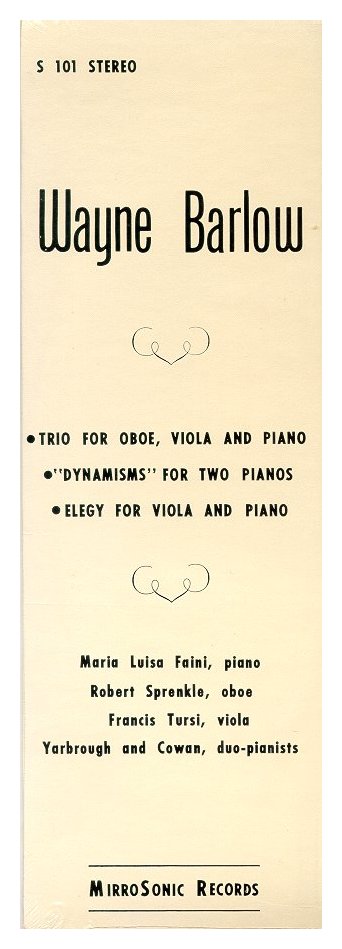
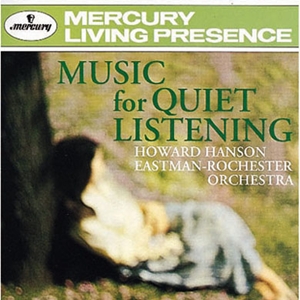 Wayne Barlow: Yes, I certainly am. I was very
close to Hanson for many, many years, as a faculty member of the Eastman
School. I studied with him, in addition to Bernard Rogers. They
were my two principal teachers, along with a little exposure to Arnold Schoenberg
when he taught at USC in the late 1930s. So it’s a varied kind of exposure
to teachers. But I worked with Hanson very closely, and came to admire
him. Of course, he was a tremendous conductor, so I have no quarrel
with his treatment of my music.
Wayne Barlow: Yes, I certainly am. I was very
close to Hanson for many, many years, as a faculty member of the Eastman
School. I studied with him, in addition to Bernard Rogers. They
were my two principal teachers, along with a little exposure to Arnold Schoenberg
when he taught at USC in the late 1930s. So it’s a varied kind of exposure
to teachers. But I worked with Hanson very closely, and came to admire
him. Of course, he was a tremendous conductor, so I have no quarrel
with his treatment of my music. 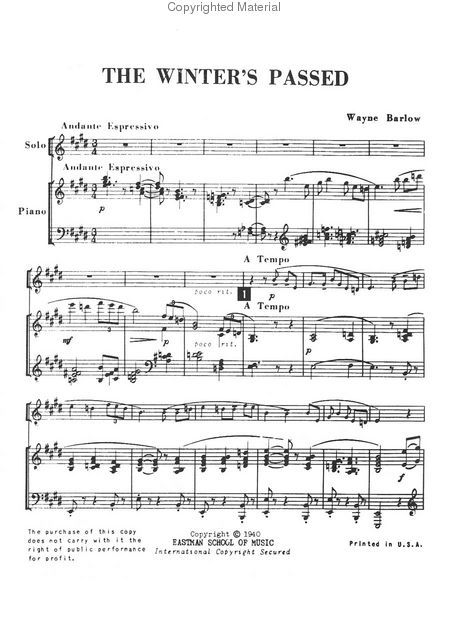 WB: Oh, I’m all for differences in interpretation;
I don’t have any quarrel with that whatever! However, there is another
recording of Winter’s Passed, which
I have not heard, and from the description that someone gave to me, it sounds
like an absolute aberration of what I wanted. And it’s not because
it isn’t written in the music. The tempos are clearly indicated with
metronome markings. Why anybody should want to take it so terribly different
from the indicated marking, I can’t even imagine!
WB: Oh, I’m all for differences in interpretation;
I don’t have any quarrel with that whatever! However, there is another
recording of Winter’s Passed, which
I have not heard, and from the description that someone gave to me, it sounds
like an absolute aberration of what I wanted. And it’s not because
it isn’t written in the music. The tempos are clearly indicated with
metronome markings. Why anybody should want to take it so terribly different
from the indicated marking, I can’t even imagine! 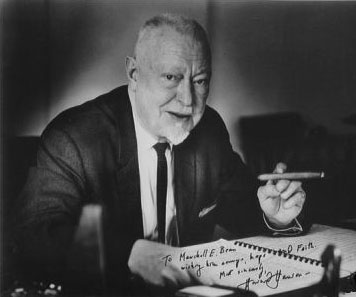 WB: Oh, yes, I
think I did. I had a wonderful career there at Eastman. My administrative
work was not completely demanding. I had a wonderful secretary who
did a lot of this for me, so I had plenty of time to write. I don’t
know how many pieces there are, but my dossier runs pages and pages.
The beautiful part about that career at Eastman was the fact that Hanson
[photo at left] was always anxious
to perform the music, not only of people on his staff — and there were several
of us composers who profited by his interest in American music — but music,
generally, by Americans all over. We were constantly listening to music
of other Americans; it was a wonderful kind of situation to be in from this
standpoint. I never had the feeling that I was constrained, or that
I didn’t have the time to devote to composition because of my everyday duties.
WB: Oh, yes, I
think I did. I had a wonderful career there at Eastman. My administrative
work was not completely demanding. I had a wonderful secretary who
did a lot of this for me, so I had plenty of time to write. I don’t
know how many pieces there are, but my dossier runs pages and pages.
The beautiful part about that career at Eastman was the fact that Hanson
[photo at left] was always anxious
to perform the music, not only of people on his staff — and there were several
of us composers who profited by his interest in American music — but music,
generally, by Americans all over. We were constantly listening to music
of other Americans; it was a wonderful kind of situation to be in from this
standpoint. I never had the feeling that I was constrained, or that
I didn’t have the time to devote to composition because of my everyday duties.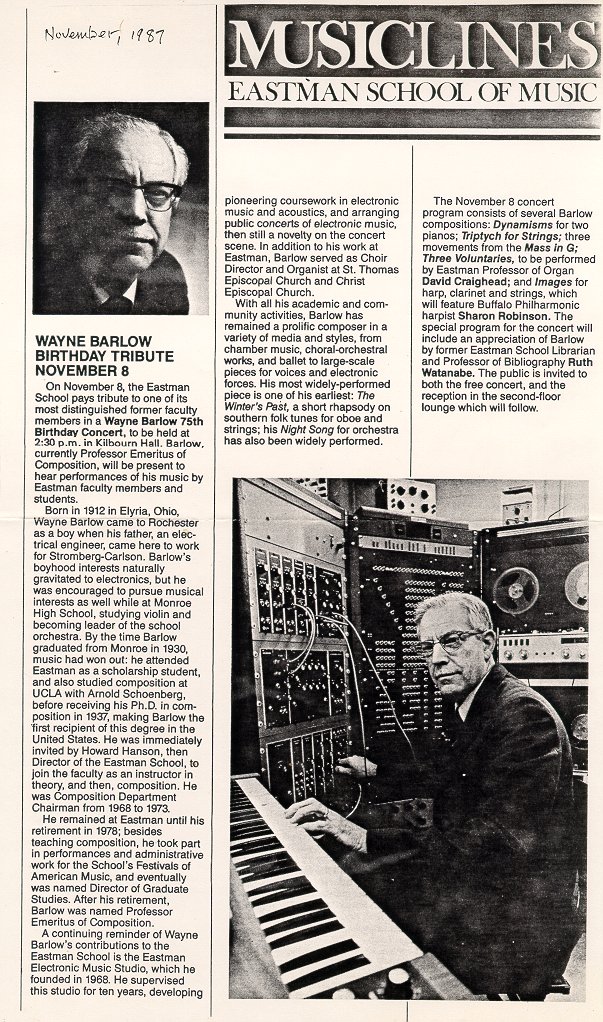
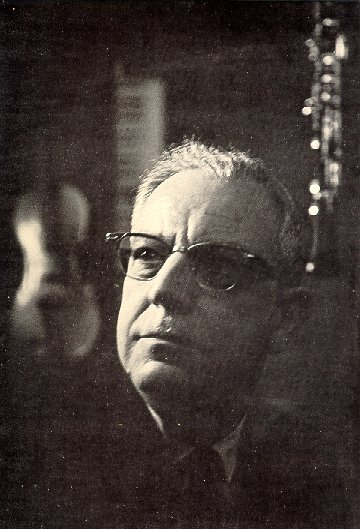 WB: Oh, I don’t worry about that. I think
it has great moments. It’s probably not all great. I don’t think
all of Beethoven’s music is great, either.
WB: Oh, I don’t worry about that. I think
it has great moments. It’s probably not all great. I don’t think
all of Beethoven’s music is great, either.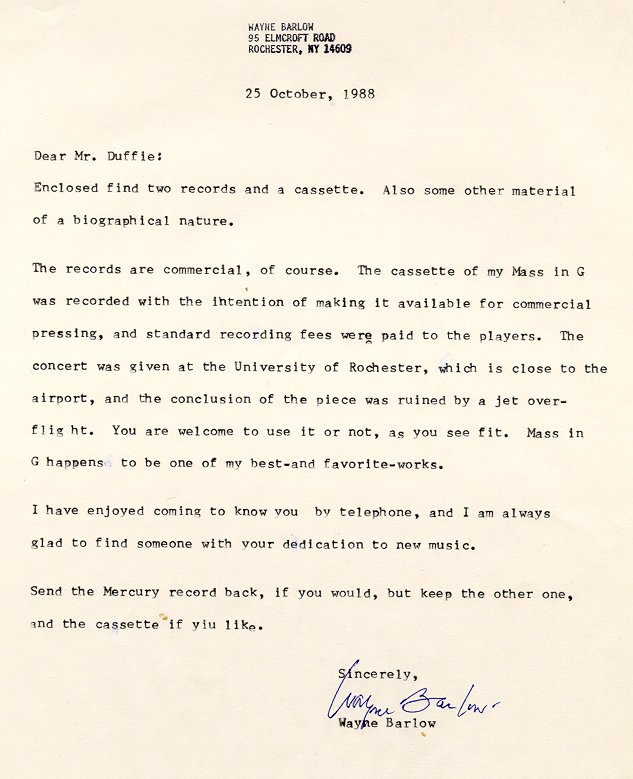
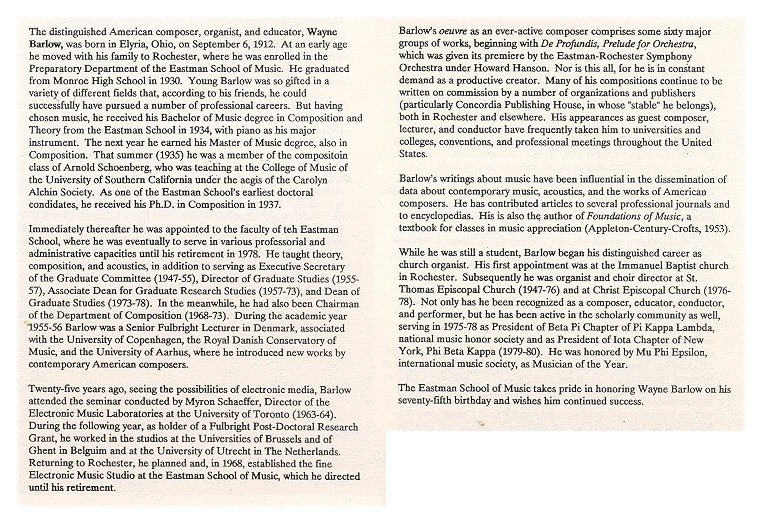
This interview was recorded on the telephone on September 10, 1988.
Portions (along with recordings) were used on WNIB in 1992 and 1997.
This transcription was made and posted on this website in 2010.
To see a full list (with links) of interviews which have been transcribed and posted on this website, click here.
Award - winning broadcaster Bruce Duffie was with WNIB, Classical 97 in Chicago from 1975 until its final moment as a classical station in February of 2001. His interviews have also appeared in various magazines and journals since 1980, and he now continues his broadcast series on WNUR-FM, as well as on Contemporary Classical Internet Radio.
You are invited to visit his website for more information about his work, including selected transcripts of other interviews, plus a full list of his guests. He would also like to call your attention to the photos and information about his grandfather, who was a pioneer in the automotive field more than a century ago. You may also send him E-Mail with comments, questions and suggestions.